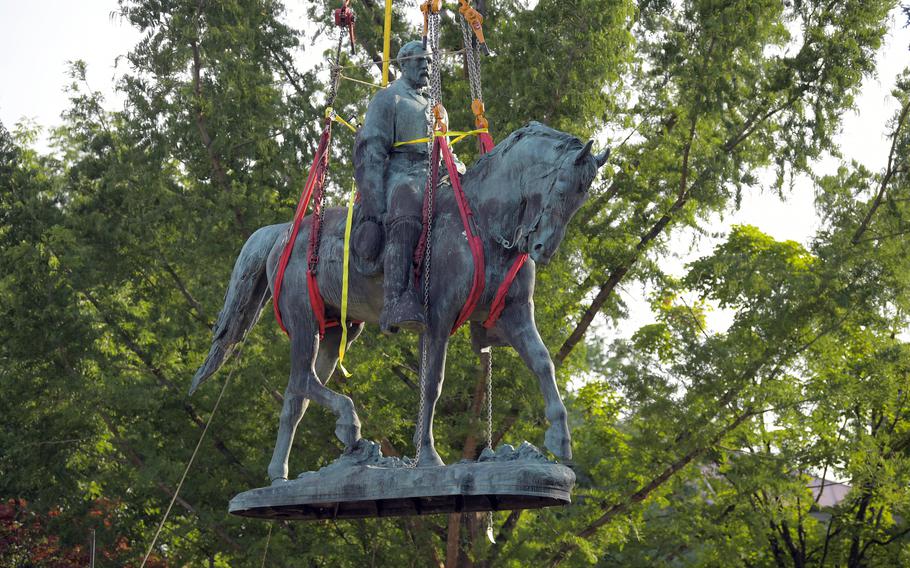
A statue of Confederate Gen. Robert E Lee in Charlottesville, Va., is lifted off its pedestal in Market Street Park on July 10, 2021. A lawsuit will determine whether the statue can be melted down. (John McDonnell/The Washington Post)
A Charlottesville, Va., museum that wants to melt down one of the city's toppled Confederate statues must tell lawyers who are suing to stop that plan where the monument is located, a judge ruled Monday, setting the stage for a trial over the sculpture's fate.
Local activists had raised security concerns regarding the bronze statue of Confederate Gen. Robert E. Lee, which had served as the focal point of the deadly Unite the Right rally in 2017 and had been the subject of a lengthy legal battle over whether it could be taken down.
Since then, the Jefferson School African American Heritage Center won a bid to take over the statue from Charlottesville and "disassembled" the monument after receiving it from the city. It is now in storage in an undisclosed location.
The ruling from Charlottesville Circuit Court Judge Paul M. Peatross Jr. means that the museum's leaders must reveal to plaintiffs' lawyers where exactly the Lee statue is located and must allow those lawyers and any expert witnesses to inspect it. But the museum will not be required to share that information with the public — a possible outcome they worried could put their plan in jeopardy.
The plaintiffs suing the city over the statue's future are the Trevilian Station Battlefield Foundation, which runs a Civil War battlefield in Louisa County, Va., and the Ratcliffe Foundation, which manages a museum in Russell County, Va., linked to a Confederate general.
Both entities had submitted bids to take over the Lee statue from the city of Charlottesville but lost to the proposal from the Jefferson School. The foundations' legal team includes Jock Yellott, who was one of several plaintiffs who sued in 2017 to stop the city from taking down the Lee statue to begin with.
"This is not like the secret recipe for Colonel Sanders' Chicken or somebody's bank account number," Yellott said in an emailed statement. "The whereabouts and condition of the Lee monument is a matter of public interest."
The Jefferson School had asked the judge to require anyone receiving information about the statue's location to sign a declaration saying they would keep that information private. Peatross's ruling included no such requirements, but the plaintiffs' legal team could still be held in contempt of court if they do go public.
Among those who could be allowed to see the statue are Yellott and "a nationally renowned expert in bronze sculpture repair and restoration" whom Yellott declined to name Monday afternoon.
Christopher R. Tate, a lawyer for the museum, said he was confident that the court's orders will be followed. "All we want is for everybody to be safe," he told reporters following the ruling.
Peatross had previously removed the Jefferson School as a defendant, but it remains a party to the suit. Its director, Andrea Douglas, was deposed by the plaintiffs earlier this summer.
On Monday, she expressed confidence in the case's outcome.
"We are making significant strides towards the proper outcome," Douglas said. "Charlottesville made a decision about what it wants to do with its statues and we are willing to go through every single one of those processes to make sure that is the outcome that is required."
Peatross also denied two requests that would have circumvented a trial. The bench trial is set for Feb. 1.